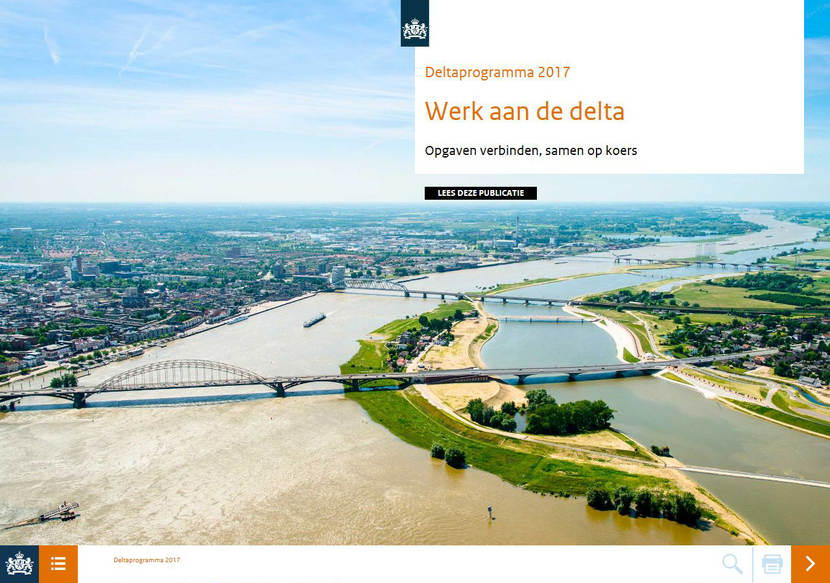Delta Programme 2017 – Linking taskings, on track together
Together we are staying on track and keeping up the pace in working on the taskings related to flood risk management, water availability, and climate-proofing the Netherlands. That is stated in Delta Programme 2017, which was presented to the House of Representatives today, on Prinsjesdag.
‘The increasing probability of pluvial flooding and heat/drought ensuing from climate change may have a considerable (economic) impact. DP2017 reflects the urgency of these topics. All the government authorities involved will draw up a concerted Delta Plan to boost the efforts aimed at achieving water-resilience and climate-proofing the Netherlands. The Delta Programme already comprises a Delta Plan on flood risk management and a Delta Plan on freshwater supply. With effect from next year, it will be supplemented with a Delta Plan on spatial adaptation. The government authorities involved thus intend to further substantiate the agreements set down in the Administrative Agreement on the Delta Programme,’ says Delta Programme Commissioner Wim Kuijken.

Some other new developments and expected milestones:
- With respect to the Delta Decision on Flood Risk Management, legal embedding of the new standards is on track. The aim is for the New Standards for Primary Flood Defence Systems bill, and the associated assessment tools to take effect on 1 January 2017. The district water boards and the Rijkswaterstaat are taking steps to implement the new standards for the assessment of primary flood defence systems as from 2017. In its schedule for 2017-2022, the Flood Protection Programme has already set down as many priorities as possible, ensuing from the new standards.
- The elaboration and implementation of the Delta Decision on Freshwater Supply is largely on schedule. All across the Netherlands, measures are being implemented aimed at economising freshwater use, and the containment, storage, and supply of freshwater. In all the regions, regional administrators, the Minister of Infrastructure and the Environment, and consumers have signed administrative agreements on the funding, scheduling, and implementation of freshwater supply measures and the introduction of the water availability concept.
- In all the regions, the implementation of measures and the elaboration of the preferential strategies is in full swing. In the IJsselmeer Region, Rijkswaterstaat has initiated the procedure for the adoption of the new water level ordinance decree. In the areas around the major rivers, MIRT [Multi-Year Programme for Infrastructure, Spatial Planning and Transport] explorations have been launched for the Varik-Heesselt flood channel and the IJsselpoort Climate Adaptation River Park. Along the Meuse, MIRT Studies have been rolled out for Venlo, Ravenstein-Lith, and Maastricht. In parallel, parties in the areas around the major rivers are collectively substantiating the preferential strategy, seeking a powerful interaction between dyke improvement and river-widening. In addition, a host of new initiatives have been taken, such as a disaster control case study for Rotterdam-Noord in the Rhine Estuary-Drechtsteden area, and the Zeeland Climate Adaptation programme in the Southwest Delta. In the Wadden Region, agreements have been made regarding three innovative projects linking up to the earthquake-proofing of the Eemshaven-Delfzijl dyke.
- Delta Programme 2017 presents the initial elaboration of the “Monitoring, Analysing, Acting” system: the “engine” of adaptive delta management. This enables us to map out the progress made within the Delta Programme: whether we are on schedule with the elaboration and implementation of the Delta Decisions, preferential strategies, and Delta Plans, and whether any new developments or insights require adaptation or further refinement of the Decisions, strategies, or Plans.
- The Royal Netherlands Meteorological Institute KNMI, the Netherlands Environmental Assessment Agency PBL, and Deltares research institute have conducted a quick scan assessment to examine the shelf life of the Delta Scenarios. Their conclusion is that the new insights regarding climate change still fit within the bandwidth of the Delta Scenarios, and that further research is needed into the further development of the transition scenario towards sustainable energy, in order to achieve the Dutch contribution to CO2 reduction as agreed in Paris. The three institutes emphasise that it would be advisable for the Delta Programme not to set its course to one or two established scenarios, but rather to make allowances for any acceleration or deceleration in the pace of developments, keep a finger on the pulse, identify potential turning points, and outline the consequences of such points in the preferential strategies.
The Delta Programme comprises a new, interactive map presenting a range of examples of projects that have managed to connect spatial planning and water. New research provides concrete leads for project leaders, policy-makers, and administrators. Both are intended as an inspiration to initiators who aim to (further) connect water and spatial planning.
This year’s Delta Programme has also been established on the proposal of the Delta Programme Commissioner, through a decision-making process in the Cabinet, following administrative consultations with the provinces (IPO), municipalities (VNG), and water boards (UvW), and a careful, concerted preparation in the Delta Programme Steering Group, seven Regional Consultative Bodies, and the administrative platforms of the Delta Programme. Civic society organisations have provided input in various ways, including through the Infrastructure and the Environment Consultative Body.